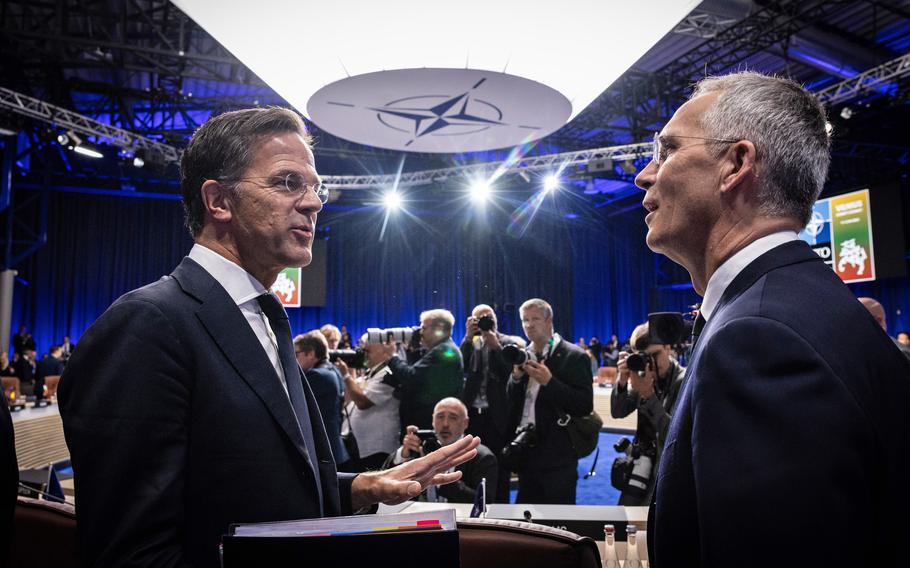
Mark Rutte, left, as Dutch prime minister, talks with NATO Secretary-General Jens Stoltenberg at the NATO summit in Vilnius, Lithuania, in July 2023. Rutte was recently appointed by NATO to replace Stoltenberg as secretary-general. (NATO)
For 10 years, NATO has been led by the same man, marking the second-longest tenure in the 75-year history of the alliance.
In October, NATO Secretary-General Jens Stoltenberg will step aside for Mark Rutte, whose own 14-year stint made him the longest serving prime minister in the history of the Netherlands.
Both men are regarded as steady and pragmatic, consensus-building and consummately diplomatic. It means the upcoming leadership change at NATO headquarters should be a seamless transition, rather than a big Brussels shakeup.
“The alliance is and will remain the cornerstone of our collective security. Leading this organization is a responsibility I do not take lightly,” Rutte said in a statement shortly after allies in June greenlighted his ascension to the top NATO post.
Rutte’s pathway to secretary-general wasn’t clear cut. In the runup, Romanian President Klaus Iohannis and Estonian Prime Minister Kaja Kallas were among the leading contenders.
Supporters of those candidates argued that the new NATO leader should hail from the east, where countries have done a better job than the Netherlands of increasing defense budgets to deal with potential threats from Russia.
However, in late June, Iohannis withdrew his lingering candidacy, clearing the way for Rutte.
In the end, the early backing of Rutte from President Joe Biden and German Chancellor Olaf Scholz proved decisive.
As secretary-general, Rutte will serve as the face of the 32-nation military alliance that is all about building consensus.
The organization, founded in the aftermath of World War II, requires unanimity to carry out its various initiatives, such as the plans for defending against a potential attack from Russia or setting standards on defense spending for member state militaries.
During his time as prime minister, Rutte was known as “Teflon” for his ability to weather crises unscathed.
The lifelong bachelor takes a typically Dutch, no-frills approach. He lives in the same apartment he called home during his university days. He also favors riding his bike to work rather than traveling by motorcade.
Rutte also has shown an ability to get along with former U.S. President Donald Trump, whose potential return to the White House could well have factored into the minds of some allies.
The most important aspect of the top NATO job is managing the alliance’s relationship with the United States, the undisputed leader of the security pact.
While NATO makes decisions by consensus, the alliance ultimately revolves around American priorities. That was made clear during the tenure of Trump, who frequently excoriated allies.
At NATO’s tumultuous 2018 Brussels summit, Trump publicly dressed down Stoltenberg over perceived alliance shortcomings and shocked other allies with behind-the-scenes threats about possibly quitting the alliance.
Stoltenberg, however, was unflappable on stage. And during the rest of Trump’s time in office he made the issue of defense spending — Trump’s main focus — his own as well.
His ability to manage the relationship spawned the nickname of “Trump whisperer” for Stoltenberg. But it may have been Rutte who was the master of damage control during that 2018 Brussels summit.
During a crisis meeting among heads of state, Rutte was selected by other leaders to be the one to attempt to talk Trump down from the idea quitting NATO.
A Financial Times report Thursday described the gathering in which Rutte figured out that the key was to give Trump credit for calling allies out, prompting them to spend more on defense and commit to spending more in the future.
Trump walked away from their subsequent conversation beaming, the FT reported, citing people who were in attendance.
“Rutte won a lot of respect from Trumpworld that day,” a European diplomat told the newspaper.